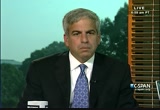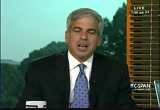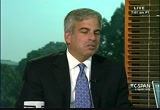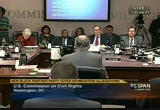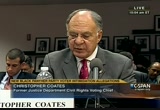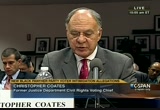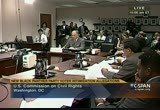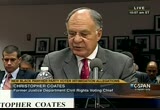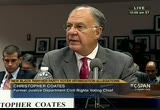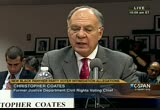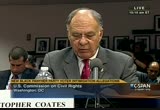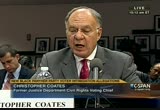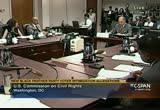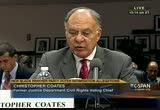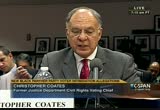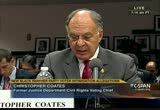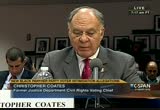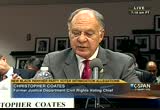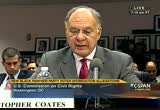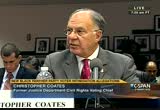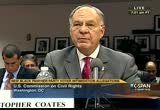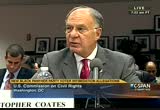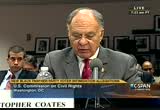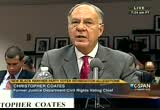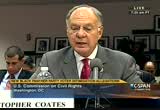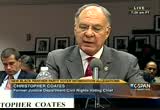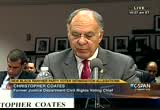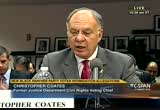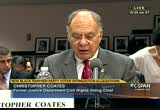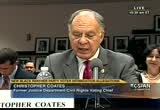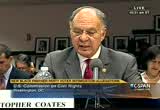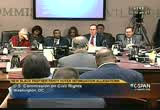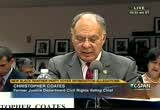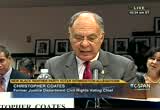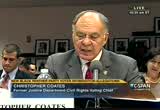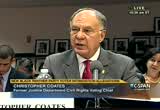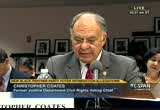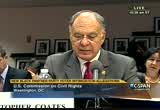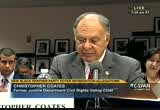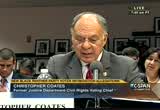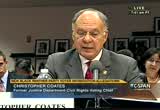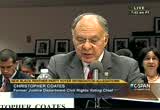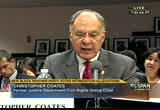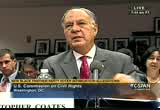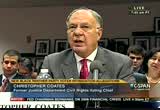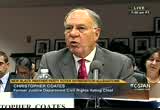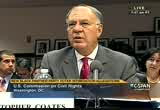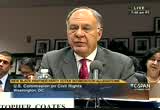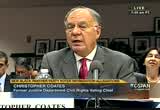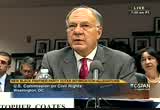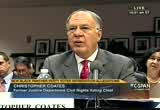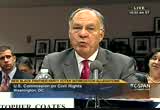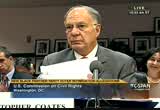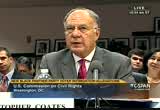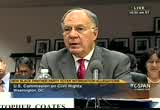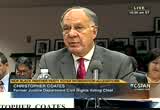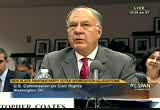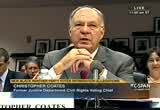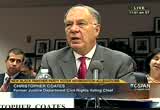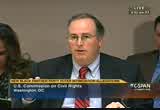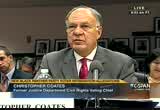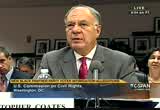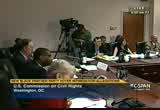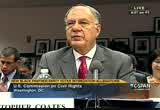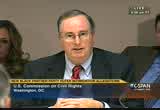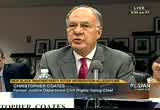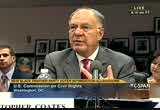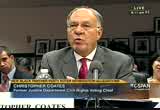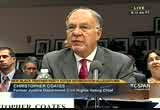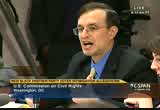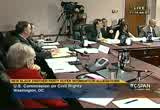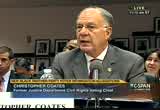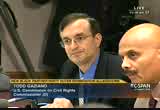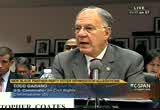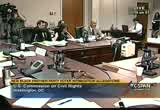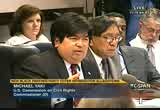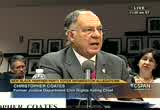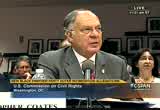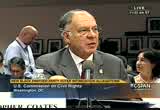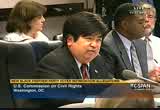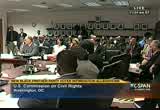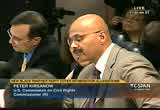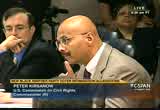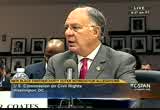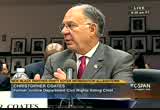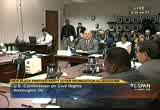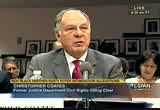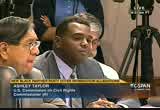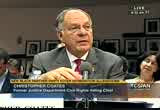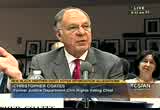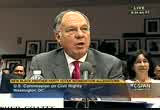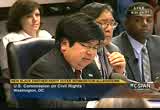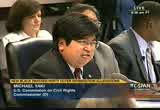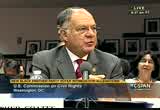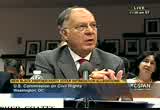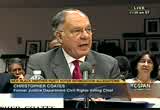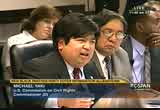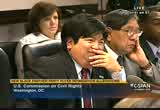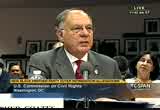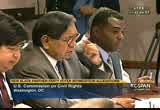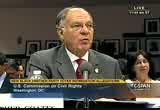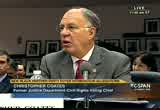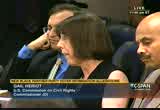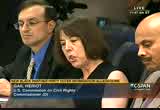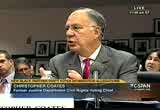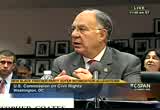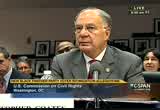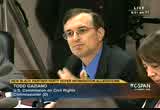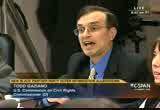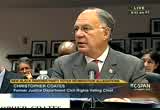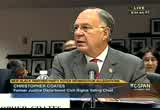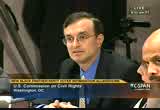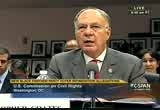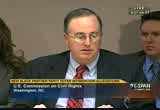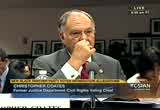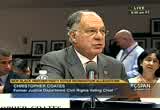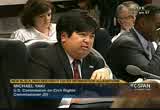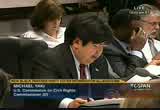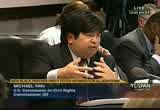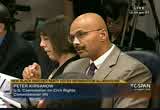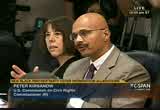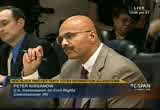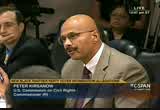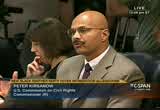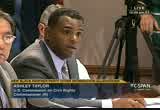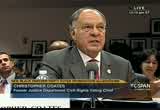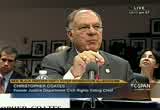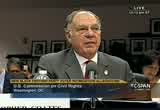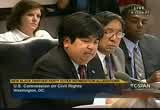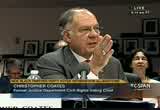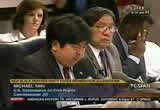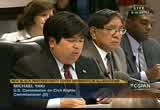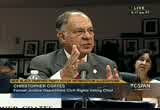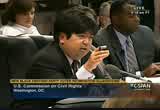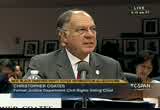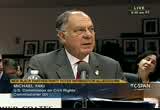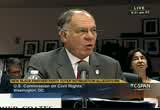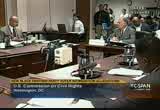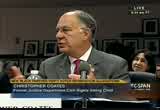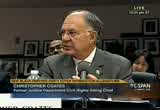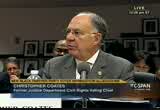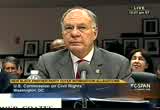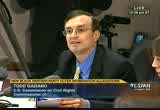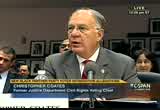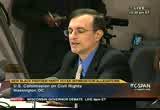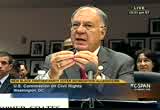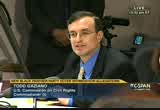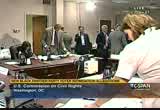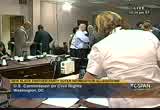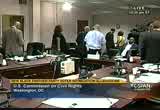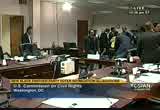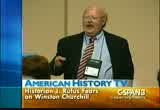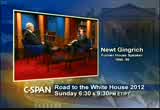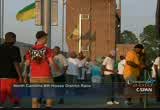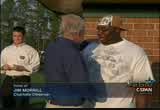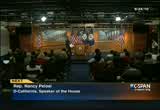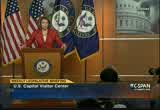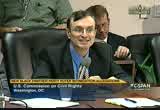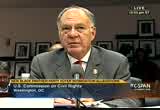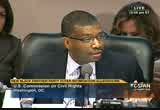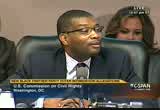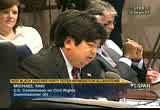tv U.S. House of Representatives CSPAN September 24, 2010 10:00am-1:00pm EDT
10:00 am
john in january. he has been trying to carry this alone -- he lost his job in january. he has been trying to carry this loan all this time. they are trying to work with bank of america. this is the third time that they have applied to have the loan refinanced or taking care of some how. they do not care how. they are just sinking, you know? and they both do not want to lose their home, but it is to a place now where they do not have a choice. it is coming up. and they are dealing with bank of america. i do not understand why it would take more than 90 days for bankamerica to either say yes or no. host: that is deep into the weeds on foreclosure issues. i'm not sure if you want to talk about. guest: unfortunately, that is
10:01 am
not necessarily an uncommon story. i get the idea from the servicers that they are trying to do their best to get these people into loans or modifications that they cannot afford and allow them to stay in their home because at the end of the day, the servicers do not benefit from foreclosing on a property. one way is to keep a viable alternative, to keep the consumer in the home. i hope it works of for them. host: let's wrap this all up. dodd/frank has mandated that mortgage disclosures become much more understandable and with more transparency. elizabeth warren is hoping to oversee the creation of the agency that would do that. what kind of timetable can we expect? guest: the timetable is aggressive. the deadline is july of 2012.
10:02 am
there are also a bunch of other disclosures that people expect the new bureau, which has been created by the law, to address. when the bureau is in effect, it does not really a scimitars until july of this year -- it did not really assume its powers until july of this year. -- it does not really assuming power until july of 2011. i think the fact that in one year or 18 months we will we have in a similar discussion over disclosures, the problem will not be likely to be solved. host: thank you very much we appreciate it. let me tell you on this friday morning was coming up next. "washington journal" will be back tomorrow morning at 7:00
10:03 am
a.m. and all day tomorrow on c- span2 "book tv." a number of fathers will be speaking live on the national model. we will be with them -- a number of authors will be speaking live on the national mall. we will be with them this is a hearing on the new black panther party broder intimidation case. the witnesses include christopher coates. [captioning performed by national captioning institute] [captions copyright national cable satellite corp. 2010] >> i summarized the evidence
10:04 am
that we had at that point and made a recommendation on which action to take. in that memorandum, i contended that deep voting section go forward, with an investigation and argued that a civil injunction against the local democratic committee was the most effective way of stopping the pattern of voting discrimination i had observed. i forwarded this memorandum to the chief of the voting section at the time. i later found out that he forwarded the memorandum to the division front office but he had omitted the portion of the memorandum in which i discussed why it was best to seek a civil injunction in the case. because i am aware that they have filed conflicting affidavits with this commission, i believe i am at liberty to address this issue without violating department of justice privileges.
10:05 am
my memorandum was not the subsequent justification memorandum that sought approval to file the case in the county, but was a preliminary memorandum that sought to go forward with the investigation. it is my clear recollection that he committed a portion of my memorandum, a highly unusual act, and was later informed that he stated that the omission was because he did not agree with my recommendation that the investigation needed to go forward with that a civil injunction should be sought. and approval to go forward with the investigation was obtained from the front office in 2004. once the full investigation into the practices comments come up opposition to it by a person now in the voting section was
10:06 am
widespread. several examples will suffice. i talk to one attorney in a voting case and asked him if he was interested in working on this case. he informed me that he had not come to the voting section to sue african american defenders. one of the social scientists whose responsibility it was to do past and present research into a local jurisdictions' history flatly refused to participate in the investigation. on another occasion, an attorney in for me he was opposed to bringing voting rights cases against african-american defendants until we reach the day when social and economic status of blacks in mississippi was the same as that economic status of [unintelligible] there is nothing that indicates
10:07 am
that department of justice lawyers can decide to not in force neutral prohibitions in section 2 of the act against racial discrimination or in 11.b. of the act until social and economic parity is achieved between blacks and whites in the jurisdiction in which the case are rise. with the help of one attorney and one paralegal, and with the support of the division front office, i was able to investigate and bring suit. but the time the case went into discovery and on trial, the bush administration hired some attorneys such as christian atoms and joshua roberts. they and i were able to complete discovery and try the case and wind and obtain meaningful injunctive relief.
10:08 am
however, i have no doubt that this investigation and case would not have gone forward if the decision had been alternately made by the career managers in the voting section when the case was first approved for investigation and then filed. it regrettable incident occurred during the trial in the brown case. a young african american volunteered to work on the ike brown case. because of his participation in the case, he and his mother, who was an employee in another section of the civil rights division, or harassed by an attorney and by and administrative employees and a paralegal in the voting section. i reported this to the bush administration voting fraud office.
10:09 am
opposition to it continued. at a meeting with division management in 2008 concerning preparations for the general election that year, i supported nor race enforcement of the act. the then chief of the criminal section complained that the brown case had caused the civil rights division problems in its relations with civil rights groups. he was correct in claiming that a number of these groups are opposed to the race neutral enforcement of the voting rights act. they had complained bitterly to the division about the ike brown case. what was not factored in to the criticism was that the primary role of the civil-rights
10:10 am
division is to enforce the civil rights laws enacted by congress, not to serve as a crowd pleaser for many civil rights groups. many groups, frankly, have not pursued the goal of equal protection from the law for all people. instead, many of these groups act as they did in response to the brown case, not as civil- rights groups, but as special interest lobbies for minorities and demand not equal treatment but enforcement of the voting rights act only four racial and language minorities. such a claim is the ultimate demand for preferential racial treatment. when i was chief of the voting section in 2008, and because i had experienced employees refusing to work on the case, i
10:11 am
began to ask for a trial attorney positions in job interviews whether they would be willing to work on cases that involved claims of racial discrimination against white voters as well as cases that involved racial discrimination against minority voters. for obvious reasons, i did not want to hire people that were ideologically opposed to the equal enforcement of the voting statutes charged with enforcing. the asking of this question during job interviews -- any problems of the applicants -- every applicant that i asked the question responded that he or she would have no problem working on a case involving white victims. however, word that i was asking applicants that question got back to loretta king.
10:12 am
ms. king in 2009 called me to her office and specifically instructed me that i was not to ask any other applicants whether they would be willing to race neutrally enforce the voting rights act. she directed me not to ask the question because i do not believe she supports equal enforcement of the provisions of the voting rights act, and she has been highly critical of the filing and the civil prosecution of the bike brown case. from her view, why should i ask that question when a response from an applicant would not be willing to work on a case against a minority election official may not in any way, in her opinion, whey against hiring that applicant?
10:13 am
the election of president obama brought two positions of influence and power within the civil rights division. many of the people that demonstrated hostility to the concept of equal enforcement of the voting rights act. for example, it in 2008 when it was complained that the brown case -- he was appointed the acting chief of staff by the obama administration. the person who forbade me to ask any applicants for a voting section position, whether he or she would be willing to enforce the voting rights act, was appointed acting assistant attorney general for civil rights. one of the groups that had opposed the civil rights division's prosecution of the case and was in the naacp legal
10:14 am
defense fund. miss clark has spent a significant amount of time attacking the position to file and prosecute the case. the acting chief of civil- rights and i were involved in a meeting in the fall of 2008 with a number of representatives from civil-rights organizations concerning the preparation of the 2008 general election. at this meeting, ms. clark spent a considerable amount of time criticizing the division and voting section for bringing the case, when in fact, the district court already ruled on the case. miss clark approached an african american attorney who had been working in the voting section for only a short period of time in the winter of 2009 before the
10:15 am
dismissals of the black panther case and asked that attorney whether the case would be dismissed. the voting section attorney was not involved in the black panther case. this incident led me to believe in 2009 that the legal defense fund for legal participation director miss clark was lobbying for the dismissal of the new black panther party before it was dismissed. it was within this atmosphere, with these managers, at the division level, and with pressure being applied by the naacp legal defense fund, that is close to the obama administration's civil rights division management group, that the decision to gut the new black panther party case was made. recent reports indicate that senior appointees at high levels in the department were involved in the black panther case.
10:16 am
it was amiss came along with her deputy that the justice department has claimed made the decision to dismiss three of the defendants in that case and ordered the limitation of the broadband interactive relief recommended by both voting section and appellate section attorneys. it is my opinion that the disposition of the panther case was ordered because the people calling the shots in the may 2009 were angry at the filing of the brown case and angry at the filing of the panther case. it was a result of their deep- seated opposition of the voting rights act against racial minorities and for the production of white voters that have been discriminated against. many of the liberal product groups that work in the civil- rights group, as well as many
10:17 am
others, believes that enforcement of the protection of the voting rights act should not be extended to white voters bush should be extended only to protect the racial, ethnic, and language minorities. even in the face of a default by the defendants, it was called by the incorrect view of civil rights enforcement. it was intended to send a direct message, in my opinion, to people inside and outside of the civil-rights division. that message is the filing of a voting cases would not continue in the obama administration. the disposition of the panther case was not required by the facts developed during the case with the applicable case law, as has been claimed, but was the cause of this incorrect view of civil-rights enforcement that is at war with the statutory language of the voting rights
10:18 am
act, which is written in a race neutral matter. if anyone doubts the civil rights division in the voting section failed to enforce the voting rights act, one only has to look at the enforcement of ection 5's pre-clearance requirements. it speaks in terms of protecting all voters from racial discrimination. this section has not imposed an objection to section 5 of the voting change on the grounds that it discriminated against white voters in the 45-year history of the act. steelyard includes no objections in the majority-minority -- indeed, the personnel in the voting sections unit, which has section 5 submissions, are constructed only to see if the
10:19 am
voting changed discriminates against racial, ethnic, and language minority voters. this practice includes jurisdictions and mississippi, where white voters are in the racial minority. it is in those jurisdictions the voting section of failure to apply section 5 protections for white minority voters is particularly problematic. on two occasions when i was chief of the voting section, i tried to persuade officials to change this policy so that white voters would be protected by appropriatein circumstances. i think the section is opposed to the race neutral enforcement.
10:20 am
as i have indicated, i am not going to testify about the statements made during my meetings with ms. king and mr. rosenbaum because of the department of justice's assertion. however, the doj has publicly articulated reasons for the panther case, and i will therefore address several of those publicly stated reasons for dismissal of the three defendants and the limitations on injunctive relief. the primary reason cited by the division for not obtaining interactive relief against the black panther member who stood -- a philadelphia police officer came to the polling place, made the determination that they had to leave the polling place, but that black panther jackson could stay because he was a certified
10:21 am
democratic poll watcher. i cannot remember another situation where a decision not to file a voting rights act case, much less to dismiss opposing claims from parties, has happened in the new black panther party case was made in whole or in part on the determination of the local police officer. in my experience, officials in the voting section always reserve for themselves and correctly so that determination to what behavior constitutes a violation of federal law and what does not. one of the reasons for this pre- emption, the determination of what constitutes a violation of the voting rights act, is that local police officers are normally not trained in what constitutes a voting rights violation. in the police report, provided
10:22 am
to this commission by the department of justice, the philadelphia police officer that came to the polling place did not determine that black panther jackson's actions were not intimidating. instead, he simply reported that jackson was certified by the democratic party to be a poll watcher was allowed to remain. local police have on occasion a sympathy for persons who were involved in behavior that affected the right to vote or violated the protections of the voting rights act. in this case, the fact that one police officer did not require black panther jackson to leave the area but became such a compelling piece of evidence in the may 14, 2010, written statement to this commission.
10:23 am
there, it was stated that "the department placed significant weight on the responses of the law enforcement first responder to the philadelphia polling place in allowing black panther jackson to escape false judgment and escaped the entry of its injunctive relief against his future actions." based upon my experience, this reasoning is extraordinarily strange to support the disposition of the panther case. another publicly stated reason by the department of justice was in a june 13, 2009, letter that a congressman wrote, pointing out that panther jackson lived at the apartment building whose lower level was being used as the polling place. this reason was later abandoned by the division, but the fact that it was inserted shortly
10:24 am
after the dismissal of the case strongly suggests it was inserted closed sometime during the dismissal. even if it was true that panther jackson resided there, and should be quite clear to all that such a fact would not have provided a legal basis for intimidating voters. to understand the rationale of these reasons for guiding this panther case, one only has to state the facts in the racial reversed. assume two members of the coup clocks klan, one of which lived in an apartment building that was used at the polling place, showed up at the entrance in kkk clothes. assume that they were yelling racial slurs at black voters who
10:25 am
were in minority of the people registered to vote at that particular polling place, and the klansmen were blocking the polling place. assume that a local policeman came on the scene and it determined that the coup clocks klan must leave, the one with the billy club, but the other could state because he was a registered poll watcher. does anyone seriously believe that the assistant attorney general for civil rights would contend that on the basis of the facts and the law, the civil rights division did not have a case under the voting rights act against the hypothetical clansmen that i describe because he resided in the apartment building that the polling place was located? or that he was allowed to stay in the polling place because he was a poll watcher? i certainly hope that that case
10:26 am
would be found merit. however, such reasons are a part of the publicly articulated grounds for the division's decision to instruct me to dismiss a significant portion of the case. based upon my own personal knowledge surrounding the case and the atmosphere that existed in the division of the voting section against racially fair enforcement of certain laws, i do not believe these publicly stated representations' to the commission and other entities accurately reflect what occurred in the panther case. they do not acknowledge, a hostile atmosphere that has existed within the division against the race-neutral enforcement in the voting rights act. in the summer of 2009, the decadent -- the deputy assistant
10:27 am
-- one of her responsibilities was to oversee the voting. miss hernandez and i worked together during the clinton administration. she spent years working for civil rights groups since our days together, mainly for civil- rights, but i would hope she would have an enforcement approach different to ms. kane's and mr. rosenbaum's. -- ms. king's and mr. rosenbaum 's. the voting section has the responsibility for enforcing or discuss, as well as other enforcement activities. in september 2009, ms. fernandez held a meeting to discuss enforcement of the anti- discrimination provisions of section 2 of the voting rights act. at this meeting, one of the voting section trial attorneys asked her what criteria would be
10:28 am
used to determine what type of section two cases the division front office would be interested in pursuing. ms. fernandez responded by telling the gathering there that the obama administration was only interested in bringing traditional types of section two cases that would provide equality for racial and language minority votes. she went on to say that this is what we are all about, zero words to that effect. when mr. fernandez made that statement, everyone in the room, talking about the conference room on the seventh floor where the voting section is located, understood exactly what she meant. no more cases like ike brown or the new black panther party case. she reiterated that directive in another meeting in 2009.
10:29 am
she stated to the entire group in attendance that the voting sections of goal was to ensure equal access for the voters of color or language minorities. it in november 2009, -- in november 2009, a brown bag lunch was held by mr. fernandez. that meeting was held on the subject of the national voter registration act. two provisions are found in section 8 of that act, requiring states to ensure that voter registration be conducted so that registration lists do not have the names of persons that are no longer eligible to vote in the district. section 8 also provides that certain notice requirements are
10:30 am
to be followed in order to legally remove persons from a voter registration list. in discussion specifically addressing the list maintenance provision of section 8 of the national voter registration act, miss fernandez stated maintenance had to do with administration of elections and went on to say that the obama administration was not interested in that type of issue. instead, interested in issues that pertained to the voter access. during the bush administration, the voting section began finding cases under the maintenance provision of section 8 to compel states and local registration officials to remove ineligibles ofrom the list. when miss fernandez told the
10:31 am
voting section that the obama administration was not interested in the section 8 list maintenance and enforcement act activities, everyone in the room understood exactly what she meant. we understood that she was not talking about section eight cases in which there is a claim that the removal procedures of section eight were not complied with. instead, she was talking about the type of cases that the voting section filed during the bush administration whose purpose was to compel the states to comply with the section 8 directive that they do this maintenance by removing ineligibles from the list. in june 2009, a commission issued a buy annual report. the report identified eight states that appeared to be the worst in terms of their noncompliance with the list
10:32 am
maintenance requirement of section eight. these were states that reported that no voters had been removed from their lists in the last two years. obviously, this is a good indicator that something is not right with the maintenance practices in a state. as chief voting executive, i assigned those to work on this matter. i filed a memo asking for approval to go forward with the section 8 list maintenance investigations in these states. during the time i was chief, approval was given to this project. approval has never been given for that section 8 list maintenance project to date. that means we have entered the 2010 election cycle with eight state appearing to be in major non compliance with the requirements of section 8. yet the voting section that has the responsibility to enforce that law has yet to take any
10:33 am
action. from these circumstances, i believe ms. fernandez's statement in november 2009 not to initiate section 8 list maintenance enforcement activities has been complied with -. the division currently has active matters under the nbra, including investigations under section eight. in making this statement, i do not believe he was referring to section 8 list maintenance cases, the kind of cases miss fernandez was referring to when she talked about enforcing section 8 because i do not believe that the voting section has recently been involved in any list maintenance enforcement during the obama administration. furthermore, it should be noted not to enforce the list maintenance provisions of
10:34 am
section 8 is likely to have a partisan a consequence as well. a number of jurisdictions that have bloated the voter registration lists or where there are sizable minority populations. for example, the election commission had not dismissed [unintelligible] the number of persons was approximately 130% of the number of people in that county the war 18 years of age or older. as congress recognized enacting the provisions of section 8, a bloated voter registration list increases the risk of voter fraud. finally, -- let me respectively submit that equal enforcement of the voting rights act is absolutely essential for a number of reasons. first, it is required by the
10:35 am
statutory language of the act. congress did not use the statutory language that speaks in terms of discrimination against racial or language minorities. extending and amending section 5 of the act in 2006, congress used the term in the voter, not racial or ethnic voters. the statutory construction given the voting rights act by the courts supports the fact that the act is written in race- neutral terms and is intended for the protection of all. when we go to work with the department, we take an oath to enforce the laws of the united states. in forcing the voting rights act in a racially selective manner is choosing not to enforce certain provisions of the federal voting law, such as the list maintenance provisions of section 8 of the act, is not in compliance with the both we have
10:36 am
taken. second, when the voting rights act was originally enacted in 1965, it probably did not make a great deal of difference as a practical matter whether provisions against racial discrimination were enforced against minority wrongdoers as well as white wrongdoers. during that period of time, there were few minority election officials. in a number of jurisdictions, there were no minority election officials. during the last 45 years, the united states has changed for the better. large number of minority persons now serve as election and poland officials and hundreds of jurisdictions throughout america -- a large number of minority persons now serve as election and voting officials in hundreds
10:37 am
of jurisdictions throughout america. it is absolutely essential that the voting rights act be enforced against all racial and ethnic groups. during my years in the voting section and during the time i served in the management capacity, i became acutely aware based upon complaints and conducting investigations that a sizable number of illegalities are committed by members of racial and ethnic minorities. the county in mississippi is a prime example. let me give you others. during that time i was chief of the voting section, which conducted a prolonged investigation and mississippi, another majority black county. the their long battle between an all black faction and a racially integrated faction has been going on for a substantial
10:38 am
period of time in that county. relations between the two factions have reached a point where the all black faction would not allow members of the racially integrated faction play a role in the conduct of local elections, including the county absentee ballots or the choosing of persons to work at the polls. after a local election in 2007, the home of a white candidate for local office was burned. no one was ever prosecuted for this burning. the burning of this home never received any national attention. the voting section did not file the voting rights act suit in the county for a number of good reasons, including the tendency of multiple selection contests in state courts during the time our investigation was going on and the fear that the filing of the suit by the department of justice under those circumstances would suggest we
10:39 am
were taking sides in the election disputes. parenthetically, we waited until all of the election contests where over until we filed the suit involving mr. brown. i came away from the wilkinson county investigation with the clear impression that some african american officials were involved in voting related acts of racial discrimination against whites. in 2005, i conducted an investigation in alabama. two other majority black counties. there were political factions in those counties. one was all black and another was racially integrated. there were multiple claims by the racially integrated faction, that absentee ballots and other types of voting fraud were being
10:40 am
perpetrated by the all-black faction in the surrounding counties. election materials including absentee ballots were placed for safekeeping in a local bank vault so that those materials could be reviewed the next morning by election officials. overnight, that bank was also set on fire. no one has ever been prosecuted for that burning. the voting section did not end up filing a case in either of these alabama counties for good reasons, including an ongoing voter fraud investigation by the alabama state attorney general's office in those counties. i have recently learned that several african american political officials have been convicted of absentee ballot fraud in another county. i came away from these investigations with the clear impression that some african
10:41 am
americans there in those counties were involved in acts of racial discrimination against whites. in pointing out these examples, i am not suggesting that minority election and poll officials or political activists are more likely to commit voting law violations than their white counterparts. what i am putting out is i believe some minorities are just as likely to resort to lawlessness in the voting area as are some whites. for the civil rights division and the voting section to pursue enforcement practices that ignored voting rights violations, members of minority groups will encourage lawlessness in the voting area because those people who are
10:42 am
inclined to commit acts of voting illegalities, black or white, will have no fear that the federal government will enforce the federal law against them. when they are in form, wind minority election officials are inclined to participate in it lawless acts learned that the federal government will not enforce the law against them, it will increase lawlessness. in our society, that is a clear recipe to undermine the public's confidence in the legitimacy of our electoral process. i have heard some argue that prosecutors, both criminal and civil, have discretion that gives attorneys in the division and devoting section the authority to bring lawsuits against minorities wrongdoers. it is certainly true that prosecutors have discretion to decide what cases to bring it
10:43 am
based upon resources and other legal considerations. but we do not have the discretion to decide to enforce the law based upon the race of the perpetrator or their race of the victim of a wrongdoing. those discretionary decisions cannot constitutionally be based upon race. in conclusion, i thank you for the time you have given me to testify on these enforcement civil-rights issues. i commend the civil-rights commission for making inquiries into these areas. individuals of good will, regardless of race, or language minority status, should be concerned about the division not enforcing laws in a race-neutral matter. as important as the act is to protect minority voters, white voters also have an interest in
10:44 am
going to the polls without having race haters whose public rhetoric includes such statements as, "kick cracker babies." standing but at the entrance of a polling place with a billy club in his hand, hurling racial slurs at voters. it was a travesty of justice for the department of justice not to allow attorneys in the voting section to obtain nationwide injunctive relief against all four of these defenders. thank you. >> thank you. >> thank you, mr. coates. i would like to ask you a little bit about your background. you were hired by the department of justice in 1996? >> yes, as a trial attorney,
10:45 am
working in that capacity until 1999-2000. i was promoted to special litigation counsel and served at that position until 2005, at which time i was appointed principal deputy chief of the voting section. in december 2007, i was appointed acting chief, and then it chief in may 2008. i served as chief until the end of december 2009. >> you had promotions during the clinton administration and bush administration. prior to the department of justice, where did you work? >> i first learned to do it voting cases. i took a job with the project at the american civil liberties union in atlanta, georgia.
10:46 am
it was in the southern regional office of the aclu. i commenced my employment there in may of 1996 and served from 1976 through until 1985. i was there 8.5 years, in which time i litigated and number of cases on behalf of african american defendants. >> you argued a case in front of the supreme court, is that correct? >> yes, that is correct. i argued on behalf of six african american citizens. the local naacp chapter in the county of georgia.
10:47 am
>> before you came to the department, he won some awards? >> i did. in 1991, i was awarded the thurgood marshall decade award by the georgia conference of the naacp for working in civil- rights. i was awarded -- i received an award from the georgia environmental association. it was awarded on the basis of my representation of seven clients hancock county, ga.. it has the largest african american population. a garbage dump company was in
10:48 am
the process of trying to put the third largest landfall in the united states in that county. >> you want a significant award while at the department? >> yes. in 2007, i received an award given by the civil rights division for the effective advocacy, the second-highest award given by the civil rights division. >> i want to make sure i am accurate. other than the brown case and the new black panther party case, you have spent your whole time representing minorities. it is that correct? >> those are the only cases that involved white victims, if you will. all of the other voting rights cases that i participated in it
10:49 am
in the department -- while i was with the department involved claims that minority voters were being discriminated against .here were other case there were other cases brought under other statutes, not race- based statutes, that would have been both black and white victims of the legality. under the voting rights act, the new black panther party case and the brown case with the only two. >> mr. adams indicated that after the election, when president obama was elected, you read the it -- you were rather closely supervised. could you describe what happened after the election? >> the relationship between ms. king and mr. rosenbaum and i were not good.
10:50 am
that relationship was not good. as i continued to serve in the capacity of chief of the voting section, the responsibilities and powers that a section chief in civil rights division normally has come up such as assigning particular lawyers to cases, assigning deputies to supervise cases, things of that sort, those powers were taken away. as the months went by in 2009 after the obama administration came to power in january 2009. >> did anyone indicate to you that this leaching away of your authority was a result of these cases? >> no, they did not make direct statements to that effect. >> you talked about kristin
10:51 am
clark and her attempts to contact the department. there has been prior testimony that miss clark approached an attorney and indicated interest in asking when the black panther case would be dismissed. do you know when that occurred? >> i think it was after the suit got filed. the contact occurred after the suit was filed and before it was dismissed. >> it was dismissed on may 15. sometime between then? >> it is my understanding that that is when the contact occurred. >> my understanding is that mr. rosenbaum first raised objections on april party 9, the day before it was supposed to be entered. does that sound accurate? >> i do not remember the exact
10:52 am
date. it was sometime in the latter part of april, that i recall first receiving any indication from mr. rosenbaum that there might be any trouble with the case from the division front office. >> going back to the kristin clark issue, did the comments that she made occur before you heard of any objections from mr. rosenbaum? >> i think it was reported to me that that conversation occurred prior to the time i was appointed the task. >> do take any further steps? >> no. ms. coates, a very fine lawyer. she is not a family member or related to me. she had just guarded in the fall of 2008.
10:53 am
i was the person who recommended that she be employed by the voting section because i thought she would make a find attorney there. this matter came up i think six months after she started i did not want to get her embroiled in a controversy of that nature within the first couple of months. she had not been an attorney in the new black panther party case so i did not go to the front office and tell them about it. >> i would ask if you could see the three internal memos. the j memo, could you identify the document? >> these documents have previously been provided to the commission by the department of justice.
10:54 am
>> know, they were provided by other means -- no, they were not provided by the department of justice. they were provided by other means. >> in that case, i do not want to identify or not identified documents that are covered by the process privilege. so i decline to answer your question. >> let me walk you through some events. my understanding is, as a the time that the decision was made to dismiss the case, they all supported proceeding with the case as was originally filed. it is that accurate? >> yes. >> the appellate section
10:55 am
numbers, -- >> that is correct. >> with the appellate section undertook a review on a case that was already in default status, have you ever heard such of the review? >> no, i have not, that does not mean that it has not occurred before. i had never heard of the appellate section reviewing any case that i have been involved in. >> the documents -- the analysis came back may 13. the default judgment is may 15. did you see a copy of the appellate section analysis? >> yes. >> were you told any reason why a trial team and the appellate section team were overruled? >> well, if you are talking
10:56 am
about conversations that occurred between ms. king, mr. rosenbaum, and i, i respectively refuse to answer that question because the department has asserted the process privilege. >> were you told by any other individuals, specifically political appointees, consulted, made decisions about the case? >> i can answer that this way. i am familiar with the judicial watch suit and the documents that have been provided in the past week. i see that there were a number of people outside the division
10:57 am
crew knows those documents released indicate were contacted, such as mr. hirsch and others at the department level. that was the first time i had received any information that people outside of the commission played air role in the decision concerning the new black panther party case. >> you mentioned a lawsuit by judicial watch. let me ask you about one entry. i understand you are not part of the documents produced. item number 50 shows an e-mail from steve rosenbaum to sam hirsch. daag provides requested follow- up information that additional
10:58 am
actions would be conducted by criminal section chief per his request. did you ever hear of the criminal section be involved? >> no. >> before he testified before the commission, mr. perez had a meeting with you and mr. adams. is that correct? >> i can affirm that there was a meeting. >> are you not going to tell us what occurred during that meeting? >> no. because of the process privilege asserted by the department. >> it was alleged that there were two days of yelling.
10:59 am
can you tell us anything about that? >> well, in terms of -- i will not tell you what the discussions were. i will tell you that i became so frustrated with the process, i did use profanity. it was not the first time that i used profanity, but it was not my customary way of speaking to my supervisors. i used the b.s. word as was identified in the testimony. to that extent, that yelling went on. >> aside from the use of profanity or not, it appeared to mr. rosenbaum that the background material had not been read for his review.
11:00 am
>> it arose because the accusation was made against me that was not true. >> can you tell us what that accusation was? >> no, i can't. >> at any time did anyone accuse you or any member of the trucking of member -- violating civil procedure? >> there were accusations made. i think mr. perot says -- perez has mentioned a rule of love an d concern. there is a section that prohibits intimidation, threats, coercion. we're talking about, mr. blackwood, rule 11 of civil procedure which would subject
11:01 am
plaintiffs to bring a civil suit to awards of money against them because there was no basis in law for bringing the lawsuit. i have always been flabbergasted that anyone would make such a claim regarding the new black panther case. people can have differences about a number of things, but we had eyewitness testimony from a videotape. there were two people standing in uniform in front of a polling place in violation of the distance required by pennsylvania law for people to be away from the polling place. one of them had a weapon. there were hurling racial slurs, including two white motors, how do you think you're going to feel with -- including to video including to--
11:02 am
white voters, how do you think your want to feel with a black president? it at times -- it prohibits intimidation or coercion or threats. it requires that no number of people be intimidated, but just that there was an attempt at intimidation. i have never been able to understand how anyone could accuse us of not having a basis in law and fact for bringing a straightforward 11-v claim in circumstances where the evidence was so compelling. >> in the memos before you, specifically the original memo, then the remedial memo, which addresses the demands by ms. king and mr. rosenbaum for
11:03 am
additional information, and finally the appellate review. there is no distinction between liability between mr. jackson or samir shabazz. did not arise? were you ever asked to analyze that? >> i did not -- i do not remember. -- i do not remember any public discussions prior to the dismissal of the three defendants in the limitations on the injunctive relief. i do not remember any public discussions of distinguishing between mr. jackson and mr. shabazz. i am not going to answer the
11:04 am
question about whether or not we have internal, deliberative process discussions about that. >> as far as the remedial memo and its purpose, it was to address existing concerns of king and rosenbaum, correct? >> i can see how you would logically draw that inference, but i am not able to confirm that. >> in looking a record -- at the record, it appears there was an extensive, substantives memo either april 29 or may 1. it was around that time and address concerns by mr. rosenbaum. -- and address concerns by -- addressed concerns by mr. rosenbaum. >> if there is a document to that effect, you would be
11:05 am
logical in reaching the conclusion that you speak of. >> when mr. adams was here, he talked about you having duple n -- to pull an all-nighter. is that correct? >> i did not. i think that there were some people working to complete the memorandum. they looked sleepy the next morning. they told me they had been there a goodly portion of the night. that is the information i have in that regard. >> it is a point of order for the benefit of the witness. mr. chair, i was a little uncomfortable about the last exchange about the e-mail on two reasons.
11:06 am
one, it is very clear that mr. coates wants to steer clear on this side of the deliberate process privilege. if you're making representations to him about when and -- what an e-mail may or may not say, adding he would be more comfortable having a document in hand to know whether to know -- k he would be more comfortable having the document in hand to know whether or not it was one thing or the other and to ensure his compliance to be on the side of the deliberate process privilege. it would be in our interest for him to make sure that he sees the document before testifying about it so that he does not make any assumptions about the content. >> so the record is clear, the document was not in front of you. i was talking about reading off of an index provided by the did
11:07 am
is awash -- by the judicial watch index. we have not yet received that. >> if there's any question that you feel uncomfortable with, please raise your hand and let us know if we're bringing you into an area where we feel -- you feel uncomfortable. we appreciate the fact to put yourself at risk by coming here to testify. i have no desire to bring you to an area that is going to increase the risk to you. >> thank you, sir. >> you gave a going-away speech on or about january 12 of this year -- i am sorry. it was earlier this january. >> january 5. >> he made a long statement to -- you made a long statement. >> mr. fernandez and mr. perez
11:08 am
were there. there were couple of people from outside the section who were there. most of them were from the voting section. some family members were there appeared a couple people from other sections in the division were there. >> do you have written copy of what was said that day? >> no. >> have you ever seen of version of what you allegedly said that day on national review online? >> i remember that an article was published that said -- it was not a verbatim statement, but it was based upon interviews he had with people who were present. >> did you ever read that? >> i did. >> although not verbatim, does
11:09 am
it accurately reflect what you said that day? >> it was an accurate reflection of the points i made. >> finally, you transferred to the u.s. attorney's office of south carolina. >> yes. i'm employed as the u.s. assistant is returning -- assistant district attorney there. >> was the decision to transfer of voluntary? >> let me explain it this way. it is not a question that i think can be accurately answered by yes or no. during 2009, i had considerable conflict with miss king and mr. rosenbaum. i saw that the management style was similar to theirs. it was a bit better as a
11:10 am
relationship. with no need to other for a long time. -- we have known each other for a long time. my powers to rome this section, assign cases, assigned deputies was being substantially reduced to where i believed, by late fall, 2009, but i was serving as chief only in name and that the decisions were being made by other management people in this section and at the division. as a manager who has -- who is blamed when things go wrong, you do not want to be in a situation where you are supposed to be running a section when, in fact, you are not. i took that into consideration. i knew that a number of people in this section -- in the division, managers -- some of
11:11 am
them did not want me as the chief, including miss king and mr. rosenbaum, quite frankly. there were a nimble -- number of people who did not army as chief of the voting rights people. some of them -- who did not want me as chief of the voting rights section. i could see this would be a situation where i could not manage this section. if you cannot do that, then there is no point in pursuing a course of action that you have no ability to win. i have relatives in seven carolina. -- in south carolina. i talked to mr. perot is about working out the situation -- mr. out aa saz about working
11:12 am
situation where i would transfer. if circumstances had been one way -- if senator mccain had won the election and had left me in as chief of the voting section, and there had been good boating -- good relations between us, then i would have stayed on for awhile longer. it is the most important job i have ever had. he now give that up easily. under the circumstance -- you do not give that up easily. under this circumstance -- i did not ask for the transfer. >> one final question. who was responsible for diminishing your authority? >> miss king, mr. rosenbaum, and miss fernandez were involved.
11:13 am
the attack of limitations they put on me, i believe they were not the kind of limitations that were placed on other chiefs in the civil rights division. i am not the only person who had these kinds of limitations, because i am not the only chief who has had with the division management, but it was unusual in comparison. >> i will yield my time. >> thank you very much, mr. chairman. thank you, mr. coates. i believe this is a morally right and morally courageous thing you are doing in coming forward today. i thank the chairman for yielding to me. i initially proposed this investigation. with their indulgence, i may have 3 or four rounds of five- minute questioning. i will begin with what i hope
11:14 am
are simple questions and answers and i never got from assistant attorney general perez. i am very saddened by the detail regarding that you and mr. adam s testified to regarding the hostility and the harassment that you and your team had when you tried to enforce the voting rights laws. that was not the first time i heard about that. i asked mr. perez about articles that were published in february, 2009, that recounted this culture of hostility to their race-neutral enforcement of the voting rights act. surely he was aware of these articles. i asked him whether he did in the investigation regarding that. i got a non-answer. i am asking you. i have a few questions in this
11:15 am
series. did rosenbaum or king or perez, when he was confirmed -- did they begin an investigation, to your knowledge, to ward hostility that existed in that in the civil rights division towards the race- neutral enforcement? >> not to my knowledge. i would have been one of the primary persons, having been the lead attorney in the brown case and having been the chief and intimately involved in the new black panther case, that, if one was going to do an investigation to determine whether or not people who had been involved in non-traditional voting rights cases -- if such an investigation was going to be conducted, i would have been one of the first persons contacted.
11:16 am
i do not know of any investigation that was specifically done for that reason. >> there were news stories in the late spring and summer, after the dismissal of the new black panthers' story, where one of the news organizations had sources that the reason for the dismissal was hostility to the race-neutral enforcement of the voting rights laws. i pointed out to mr. perez that his confirmation was upheld -- delayed because of those stories and the request of members of congress that are not being fulfilled for information on that. surely he read that. i asked him whether when he came an office there was any investigation regarding -- came in office there was any investigation regarding that. i take your answer be the same that you are not aware of any
11:17 am
investigation during summer, 2009. >> i do not. >> september, 2009. there was a lunch meeting with fernandez. it shocks me for a different reason. reduce the testified in response to mr. black would -- you previously testified in response to mr. blackwood that the remarks that were published were accurate. in that statement -- that paraphrase, you decry the hostility to race-neutral enforcement of the voting rights laws. i asked mr. perez, the you contact your former voting section chief, mr. coates, and say, why did you believe that?
11:18 am
i got an evasive non-answer. did he contact you? >> no. >> did he or king or fernandez or anyone above you say, why do you believe that? >> no. i was not contacted by anybody with the department why i had stated on january 5 that there was an atmosphere of hostility toward race-neutral enforcement and to those cases. >> one concluding question? >> you'll have to take care of that on follow-up. >> i am yielding my time. >> i appreciate that very much. thank you for coming here to testify. thank you for yielding your time. >> thank you for having me.
11:19 am
>> i have questions about the j memo. i have a feeling that you were not aware that this was the rich -- that this was produced at the request of the debris of injustice that you cannot comment on the specifics -- -- of the department of justice that you cannot comment on the specifics. can you clarify what that is? it is the last memorandum which puts together the evidence to date -- >> it is the last memoranda which puts together the evidence to date with the attorneys right to justify it and try to convince the people at the division level that a notice should be sent out. that letter goes out saying, we have investigated and we believe you are in violation. >> thank you. are there other memorandum that
11:20 am
initiate the investigation? let's take a hypothetical example of two individuals in front of a polling place somewhere who may allegedly been involved in voter intimidation. i do not know if you can talk about the specifically. hypothetically -- whichever is most convenient to you for your own protection. let's make it hypothetical, but if you want to make it real, we can do that. information comes to you -- is that as the section chief, to the attorneys underneath you who bring it to your attention? how does the investigation began? >> it commences a number of different ways. it comes to the section chief directly, what this section chief would do if he or she felt that the complaint had a reasonable possibility of being
11:21 am
meritorious, attorneys would be assigned to investigate. those attorneys would then work on the investigation. a deputy would be assigned to supervise the investigation. after the investigation was completed, a j memorandum would be written by the attorneys and passed through the supervising deputy, then to the chief, then the civil rights division. >> the number of people who would have access to the justification memo would be the investigating attorneys, their immediate supervisors, the principal deputy, you, and then your -- >> not necessarily. >> but you would have received a j memo on the new black panther case. >> under ordinary circumstances,
11:22 am
yes. >> but you cannot say that you received one? >> i can confirm that i received that. i would rather not identify a particular document as being that specific memorandum. >> can you identify how that case came to your attention? >> i have checked my e-mail on that. the first person to call me was a young man who used to work in the voting section and was at that time working in the criminal section, named jim walsh. on election day, a 2008, he was monitoring complaints in the criminal section, just like we were monitoring complaints in
11:23 am
the civil section. he sent me an e-mail to alerting me to the fact that he heard about the complaint. subsequently, a received an e- mail -- i received an e-mail from, i think it was the chairman of the pennsylvania party making the same complaints. >> is that when u.s. signed -- when you assigned christian adams? >> no. what action i took that they was to speak -- we have poll observers in philadelphia. i spoke with the people up there and ask them to go by the polling place. i give them the location to see if they could find out what was going on. >> last question. >> prior to the justification
11:24 am
memorandum, the last that is developing the case. who started developing the case to deliver that memorandum to you about the new black panther party? >> the deputy i assigned was bald -- bob pauper. i believe he was on the philadelphia coverage. i think he was up there that day. the two attorneys included christian adams and spencer fisher. >> thank you. >> thank you, mr. coates, for coming forward today. your former colleague has said it was probably the most profound testimony -- i said it was the most profound testimony
11:25 am
i have heard. if you are in the audience, you have now been trumped. [laughter] i would like to read into the record a letter that was delivered yesterday to attorney general holder who says, "i would like to strongly support mr. christian coates compliance. i want to make you aware that part of appearing before the commission is sharing information regarding the voter law. he has the responsibility to comply with the commission's subpoena, despite the department's obstruction. i hope mr. coates will face no repercussions. the anti-bad legislation and protection law for federal employees guarantees the right of any person can furnish
11:26 am
information to any member of congress and the shawmut be interfered or tonight -- they shall not be denied or interfered with which are as ranking member of the house committee -- interfered with. as ranking member of the house committee, i will take this very seriously. a copy of this letter will be submitted to the congressional record for public review. i have taken up half my time just saying that. due to time limitations, i will ask a series of questions that i think are capable of yes or no answers, but feel free to elaborate if you believe they
11:27 am
are not. mr. adams testified in july -- i just want to confirm and perfect the record what the testimony has been. do you agree with mr. adams that the doj's voting section has a racially-motivated policy of not enforcing section 8 of the voter registration act? >> i do not make the claim that it is racially-motivated, but we have received instructions from the deputy assistant attorney general. i was in the room when they were stated, as were a number of other people from the voting section, in which it was said there was no interest in enforcing that section. i heard miss fernandez say that. >> do you agree that the voting section has a policy or practice of not enforcing the voting laws against minority
11:28 am
violators? >> there was a pattern and practice of doing that until the brown case was filed in 2005. i hoped that pattern had been amended and changed with the ringing of that case and the success of that case. two things have caused me great concern about whether or not that pattern of non-enforcement or selective enforcement has been reestablished. there were the did missiles -- the dismissals and the element on in injunctive relief in the panther case in the instructions that miss fernandez gave us in the meetings of september. when the deputy attorney general says to the voting section the things that she said in terms of what you are interested in and what you are not, it has
11:29 am
tremendous impact. she is speaking for the aag on civil rights and ultimately for the attorney general. >> you agree there was a culture in the voting section or civil rights division, broadly. these were favored toward white victims? >> i do not think it exists to the same degree with every employee in the voting section. there were some employees in the voting section who do not agree. generally, there has been that pattern of hostility that is reflective of a point of view of some of the major civil rights groups in this country. >> thank you. >> commission and share their. -- commissioner taylor. >> thank you.
11:30 am
thank you for appearing. there are strained relationships between you, king, and rosenbaum. that struck me as to your background. you were promoted under two administrations, both bush and clinton. in your view, what was the cause of the strained relationship specifically? >> it might be that they just do not like me. and that happens to you sometimes. i think that they were -- the group of people in management positions of the civil rights division -- they had been there for long time. if it had been their choice, they would not have filed the ike brown or the new black panther cases. perhaps they would not have sent
11:31 am
federal observers to places like wilkinson county, mississippi. i think those views are strongly held by some of the career management, people in the civil rights organizations. when people disagree, sometimes on ideological, legal-type issues, hostility comes to the surface. i think that was probably part of the rough times that the three of us had. >> when you were promoted to the position of chief in 2008, you indicated that you started to ask applicants for trial attorney forwhat seems like -- a trial attorney positions what seems like an odd question.
11:32 am
could you summarize this? i want to make sure i get this right. would you be willing to equally apply the law to all people? is that the new question you began ask? >> yes. >> why did you feel compelled to ask that question in the context of hiring trial attorneys for civil rights division? >> i had a number of people -- a social scientist to i had worked with for a number of years. his refusal to work on the investigation was not personal, but -- he flat out refused to work on the investigation. i had trial attorneys i had worked with in cases that were successful and we had good relationships with. blank thatme --point- they did not come to the voting
11:33 am
rights section to sue black people, african-american people. because of those comments over the years that the brown case went on, i wanted to make sure that i did not hire people who felt that they could not work on cases involving wrongdoing by minorities because of their political or ideological feelings prohibited them from doing it. i wanted to hire people such as j. christian adams who would work on behalf of african- americans and against the black panthers, too. i did not like the limitations that i was finding that people put on what they were willing to work on. if one has a private practice or works with a private group, then one might be able to make decisions about which types of cases to do.
11:34 am
when you are paid by the taxpayer and you were working for the department of justice, i think it is totally indefensible for employees to take the position that they are not going to enforce race- neutral laws in a race-neutral manner. i thought it was completely appropriate ask that question. reebok did mrs. king ask you to stop -- >> did mrs. king ask you to stop asking that question? >> she did not ask me. she told me, you will not ask that question again. >> was that part of your strained relationship? >> the strain was probably already there. that conversation did not help our relationship. of course, i complied and i did not argue with her. as the acting assistant attorney general, i felt she had the authority to give me that direction. i thought the fact that she gave me that directive spoke to her
11:35 am
own view of race-neutral enforcement of the voting rights act. >> thank you, mr. coates. >> thank you. mr. coates, in 2005, a key were made the principal deputy of the voting rights section, you were in 2005, you were made principal deputy of the voting rights section. >> i was still in that position because of my own choosing. the way in which the chief of the voting section chose to assign matters is that there would have been a number of things occurring after i became principal deputy that i would not have personal knowledge of, but other things i would. >> i want to ask for your
11:36 am
recollection, based upon your work over the years in the voting rights section. you talk about some examples. you have made the indication that the black panthers was outrageous. i take part of that was that one person was carrying a baton -- a weapon, i think you call it that in your testimony. >> that was one of the factors, but certainly not the only one. >> i understand. in 2006, i want to talk about the situation in arizona when allegations were made that three fairly well-known anti-immigrant advocates were filming latino voters at polling places. one of them had a gun -- an open-carry gun. there were allegations that some of them had hand printed badges.
11:37 am
was there an investigation into that issue while you were there? >> i am familiar with that matter. i learned about it after it occurred and after it came to the department. i can talk to you more about it in 2008 than i can in the years before. yes, it did come to the voting section. my understanding is that, in 2006, it was investigated. in 2008, my recollection -- and i have not looked at those files in several years. my recollection is that we did send an attorney to pima to investigate. we did send a federal -- send
11:38 am
federal observers during the 2008 election. i cannot remember if it was the primary or general or both. one of the factors that we relied upon in sending federal observers to pima was the incident that you referred to involving some minutemen. >> i understand if you cannot answer this question. being here on the commission, when you see facts of a certain genre, you think there should be equal treatment before the law. why, in 2006, given the fact that in 2008 it was important enough to send an observer, why was an investigation not opened into this matter? to you have any personal knowledge of that -- do you have any personal knowledge of that? >> i think there was an
11:39 am
investigation opens. the information that i recall being reported to me was that it did involve three people who were probably associated with the minutemen, that arizona had -- i can remember if it was 50 or 100 feet, but the state has an area which you cannot be in. the minutemen activities took place outside that area. i remember seeing a picture of the man -- one of the men who was wearing a holstered pistol. that did give concern. the investigation determined that he did not draw the pistol.
11:40 am
fortunately or unfortunately under arizona allayed of view, our investigation determined that one can wear a holstered pistol in arizona. >> i'm curious. i think he would agree that the voter intimidation takes many forms. the fact that you have a holstered pistol within 50 feet or 100 feet or the entrance to the parking lot, i would think that would because -- i guess i am curious as to what the standard is. is it because the panthers were within 100 feet that it was a problem? these guys with guns or outside 100 feet. it is a little unclear to me if you are intimidating voters why it matters whether you are 25 feet, and 50 feet, 100 feet, wherever, holding signs that are threatening. there should not be a distance.
11:41 am
it is a matter of judgment and perception, is it not? >> yes. i think the pima situation was something that needed to be looked into. during the time that i was chief, it was looked into. making determinations about whether or not federal statute has been violated -- you have to give consideration to the by aervailing claime person that where the person was in the activity in which the person was involved in is protected by state law. that is not a determination that completely binds the federal government, but is something that we need to look at. repligen follow up on that later. we can follow up on that
11:42 am
later. >> we did research to find out that the legal -- the person was legally entitled to wear a pistol. if the pistol had been drawn, it would be a different set of facts. those facts would be much more in favor of a violation. anything that happens at a polling place that might keep voters from voting is a serious matter. >> thank you. >> i want to thank you for being here. i just received testimony a few minutes before this convened. why have you decided to come before the commission now as opposed to earlier? as something changed? was their previous testimony that you wanted to get on record? >> in looking at the august 11
11:43 am
letter by mr. perez, i was still hoping there might be a change by the department and i would get permission to testify. i would rather be here with their permission and without -- than without. as i previously testified, there were some statements made by mr. perez in his august 11 letter to the chairman that i disagreed with. i do not think they are actually correct, though i do not claim that they are perjured. the combination of seeing the representations' by the department, knowing that i disagreed with some of them and that i had personal information concerning some of them, let me to believe that the correct thing to do would be to testify.
11:44 am
>> my other question was regarding the reluctance to enforce race-neutral l.a. debut against minorities -- is it your opinion that we're talking about african-americans or also hispanics, native americans, asians, that there would be a reluctance to move forward on even those cases? >> the velocity that some people have is the voting rights act was intended -- i think the philosophy that some people have is the voting rights act was intended to benefit people of color, therefore they should not apply this to minorities. particular cases i have talked about our cases in which -- are cases in which the wrongdoers' or african-american --
11:45 am
wrongdoers were african- american. i think that same principle applies if it were hispanic, asian, more broad, to the division into the section. >> thank you. >> i want to join my colleagues in thanking you for your testimony. you said you did not believe the policy against enforcing section 8 list maintenance cases was racially motivated, but did not say what you thought motivated it. can you comment on that? >> i think what motivates that is the reluctance on the part of 0-- the mindset of taking people off of a list.
11:46 am
they would rather leave 100 people on who were not eligible rather than run the risk of taking one person off who was eligible. i think that grows out of the past history when people who were eligible were unlawfully taken off. >> they disagreed with congressional policy. >> yes. i did not claim it is the motivation, but the consequence is to favor, in certain jurisdictions, the -- there are large numbers of minorities in some areas. i do not claim that is the motivation. i do not think it is a racially- motivated failure to report. >> the incident that interested me most involved the job
11:47 am
interviews with job applicants. if anything illustrates a culture of hostility to race- neutral administration of the law, i think that would be the incident that best illustrates it to me. the whole purpose of the civil rights division is to ensure the racially-neutral administration of the law. in some respects, i would say the question ought to be mandatory. what i want to ask -- i know that you are not supposed to ask a number of questions to applicants for career positions that would get into their own political background and such. are there any written procedures that you used in the voting rights section of the civil rights division generally in interviewing job applicants?
11:48 am
are there such procedures that we could look at? >> i think there were some in fact that the time -- in effect at the time. there were some procedures in 2008. since mr. perez became aag, there have been amendments to the hiring procedures. some of those amendments may address questions that can and cannot be asked of applicants, but i am not sure. >> do you remember anything specific on that? on amendments? >> it is a matter of public record. there were some amendments made to the hiring procedures that set up committees that interview
11:49 am
and delegate power as to who does the first interview and how many interviews are conducted and at what point the matter is turned over the -- over to the attorneys at the next level. i believe some of those regulations have been amended since i moved to charleston. >> it was miss king who told you not to do that. did she tell you why? >> no. she wanted to know if i had asked people that question -- whether or not there would be willing to work on a case like ike brown. i phrased it several different ways. this is what the case was about. would you be willing to work on this kind of case as well as
11:50 am
section 2 on behalf of african- american or hispanics? i would have been -- i might have asked it in another way. i told her that i had asked and why. i had problems with people telling me they were not going to work on a case that had been authorized by the division front office. the civil rights division authorized the black panther case. that is why i wanted to ask a question. she knew what the context was. >> isn't the whole purpose of the civil rights division to ensure the race-neutral --
11:51 am
>> we will have to take care of that during the next round. >> should i yield back? >> no. go ahead. >> neither perez nor anyone higher than you asked you why you believed, as you stated in your farewell speech, why there was hostility to the race- neutral enforcement. you testified very clearly that king, fernandez, and rosenbaum are hostile to the race-neutral application of the voting rights law. is that possible? >> i do not think it is just possible, i think it is possible -- probable. >> he said he believes in the race-neutral application of the voting right law.
11:52 am
i told him actions speak louder than words. i mentioned the newspaper article about the knoxby hostility and harassment. there were articles that the new black panther suit was dismissed. there was the speec hby chris -- speech by mr. coates. if you did not believe that, why did you not issue a memo to your staff saying that it is not the policy of the department -- just to clear up the confusion -- it is not and shall not be the policy and anyone who says otherwise is going to be in trouble. i asked him if he ever issued such a statement. he gave me a long winded the nile -- long-winded denial. did perez or anyone say these
11:53 am
allegations are not true and it is not the policy of this division to enforce the civil rights laws in a way that is racially-selective? did any one issue that kind of memo, statement, or policy? >> no. i think generalizations have been made. mr. perez has said they follow the law. every aag makes that kind of self-serving statement. what needs to be done, in response to your question, when you have a deputy assistant attorney general come down and say the administration is not interested in filing section 8 list-and in cases or that we only file cases on behalf of minorities, someone in a
11:54 am
position of authority ineeds to come to the voting section or go to a meeting where all attorneys are going to be there and specifically told them, i have been informed this is what was said. this is not the policy of this administration. that has not been done. what has been done for the last year-and-a-half is cliches like we are open for business, we are going to restore the civil rights division. during the bush administration, more suits were filed during the civil rights act and the voting rights act than were filed in the clinton administration. the idea that it was not actively enforced during the bush administration is not true. other than the specifics you have talked about, we have only heard cliches.
11:55 am
>> let me just move past -- thank you. that is very valuable. let's go to the months preceding perez's testimony. i understand a week during which he testified there was a meeting in which some of the trial team briefed him. it has been reported that you participated by conference. is that right? >> yes. >> i want to hone in on that in another line of questions. since the case is dismissed, i do not think it would be deliberate ive. did you or anyone else make mr. perez aware of the hostility to
11:56 am
the race-neutral enforcement in the knoxby case? >> with regard to my conversations with him, i do not think we have ever discussed that case. the meeting you are talking about was focused on the new black panther party case. >> did anyone make him aware that there was hostility to the race-neutral application of the law? >> i am sorry. next round. you mentioned there were several black employees at the department of justice who elected to work on both of those cases. correct? >> it was one employee who worked on both of them. >> to you believe his career will be adversely affected by his decision to work with you on those cases?
11:57 am
>> i do not know, but i know he was made to feel uncomfortable in the voting section by employees of the division who and justifiably criticized him. >> same question for his mother. will her career be adversely affected because of her son's decision to help you in those cases? >> his mother had been working for the division for a long time. she was there in 1996 when i got there. i think that she is a very treasured employee. i think that she weathered that. i do not think her career will be adversely affected. >> thank you. i will yield some of my time to mr. blackwood. >> two questions. i want to confirm some statements that happened in mr. adams's testimony. the deputy in the voting section stated to you during a trip to investigate, can you believe
11:58 am
we're being sent down to mississippi to help a bunch of white people? >> yes. >> another deputy said, i know ike brown is crooked, but the resources of the division should not be used that way. >> that statement was made by a deputy chief who is no longer with the department. gilda daniels. she was indicating to me in casual conversation that brown's reputation for law -- this is well known in the african- american community as well. she felt we should be using our resources in the voting section in other areas. >> that is all.
11:59 am
>> ok. vice-chair? >> i am yielding my time again. >> thank you. mr. coates, i'm still fascinated by these inner- workings of voters rights section. you indicated that there were investigators who were armed and went into the homes of elderly, minority voters, asking them who they voted for. they felt very intimidated. i believe that complaint was relayed to the civil rights division. can you tell me what the disposition of that complaint was? >> yes. since mr. perez talked about that, i will, too.
12:00 pm
i was in charge of that as a principal deputy. we interviewed african-american voters in that jurisdiction in mississippi. we interviewed them telephonically. there were witnesses -- some investigators have come in.. they were doing of virtual investigation. there is a mississippi law that prohibits them, except in very specific special circumstances, to have a legal example -- we did that investigation. i recommended that we do a complete investigation in that
12:01 pm
jurisdiction, because i felt that those questions were inappropriate and improper. my recommendation was not followed, and the matter was not followed up. >> who did you send their recommendation to? >> mr. sloslind. >> i want to turn back -- there are so many questions. on the new black panther case, i am fascinated by one aspect of the entire case. this was election day 2008. as you said, you are saying mr. popper and mr. adams were part of the team. there was a j memo february 2,
12:02 pm
2008. i am going to give you a series of e-mails that were produced, that are not privileged because they were produced by mr. adams who is a third party. chronologically, they go from most recent to the earliest. i would like to draw your attention in particular -- hang on just one second. i have too many papers. you have -- ok. on the third last page. this is december 10, 20008. this is from christian adams to a redacted.
12:03 pm
for policy reasons, we will not tell. "i have a real problem on this. i am trying to figure out the poll worker who said she was harassed. i am getting three different versions. basically, -- i am getting three different versions." basically if you read that e- mail, and on this e-mail -- the last two lines are "i have tried to get some clarity. cannot cometive' quick enough, as you can imagine." i want to talk about investigations, including possible allegations come a weather inp it wasima or -- whether it was pima or
12:04 pm
mississippi. again, for various reasons, justice did not take any action in those which you think were justified. my question on reading this is, you said -- >> mr. yaki, you are out of time. >> ok. my next question is going to be on that. >> [inaudible] it is still your position, i the case behind -- bringing the case against these defendants was sound, correct? >> correct. >> is it your position -- without getting into be delivered a process -- is a cure position -- is it your position
12:05 pm
that the threats or the hostility you described surrounding the race-neutral voting rights law is in the civil rights division broadly? >> yes. >> we understood the department of justice was asserting the deliberative process, and thus refused to produce certain employees. they steered clear of the deliberative process privilege. they asked that they produce, among others, you, to testify exclusively about non-privileged matters. i think we made that accommodation in mid-august. did anyone from the department of justice contact you with respect to whether or not he
12:06 pm
would be testifying on non- privileged matters? >> no. the only communication i got in that regard was a copy of the letter mr. perez that sent to the chairman -- a copy of the letter that mr. perez sent to the chairman. i may have gotten it off of your web site. i have a copy. people were calling me and saying, we got this request for you to testify. you cannot talk about this process. no, i did not have any discussions about that. that was -- >> that was done despite the fact that there is a provision in federal law that requires the department of justice to cooperate in an investigation and no privileges were asserted to keep you from testifying. my colleague touched on that
12:07 pm
statements regarding ms. fernandez. to your knowledge, it has she repudiated or rescinded or amended the comments she made concerning a race-neutral voting rights law the -- concerned race-neutral voting rights law in the? >> not to my knowledge. >> to your knowledge, has any member of the department of justice it rescinded, repudiated, or amended the statements made by ms. fernandez regarding the pursuit of section 18? >> not to my knowledge. i have looked for that. i was hoping there would be some. there has not been any repudiation of that. >> similarly, with respect to changes relating to the enforcement of the voting is -- voting rights act, it has there been any repudiation amendment
12:08 pm
or decision on that those statements, that they are bringing a case against minority violators of the voting rights act? has anyone repudiated, rescinded, or amended to your knowledge those comments? >> not to my knowledge. there have been general statements by mr. perez. i do not know they came before or after ms. fernandez's statements in september 2009. a iscliche. -- it is a cliche. it has been reported to me that ms. fernandez made this and that statements. that has not been the policy of the obama administration. that has not been done to my knowledge. >> i take it there has been no disciplinary action or reprimands taken against anyone
12:09 pm
who has made such statements with regard to section 8 of this law. >> no, but since i have been in charleston, since the 11, i would not know if there had been -- since the 11th, i would not know if there had been action taken. >> with respect to the voting rights system in the department of justice, have you been involved in cases -- >> commissioner, we will have to follow that up later. commissioner taylor. >> i would like to ask about the lobby from the traditional civil rights groups. you indicated in testimony that then-chief of the criminal section indicated that the brown case had caused their section considerable problems in the civil rights committee. he went on to say that he was correct in that a number of
12:10 pm
these groups were opposed to the race-neutral voting rights law enforcement. >> that is correct. >> can you elaborate on that? >> i think the best indication -- the subject was raised in an management meeting, because i presume, he had received a number of complaints from people in the group's who were asking, what are you all doing? what are you doing? things to that effect. it was common knowledge that a number of people in leadership positions in a number of civil rights groups, such as lgf criticized the bringing of the brown case.
12:11 pm
the meeting that i talked about that took place in the fall of 2008 was attended by about 20 representatives of almost -- i will not say every civil rights group. but the major civil rights groups in this country. whether it was aclu or committee for civil rights under law, lbf, national naacp, a number of others. i am sorry. the names miss me at this time. those organizations were represented, and ms. clark did a criticism of the brown case. and all those organizations were in attendance. there was no one organization
12:12 pm
that at that meeting said, by the way, the naacp or aclu, we think that you all did right by bringing a case in knoxby county, mississippi. there was no organization. i do not remember a single -- i talked with leaders of civil rights organizations on a fairly regular basis when i was chief of the civil rights section. i think the job of the chief is to keep up, if you can, with relations. you can hear about the cases that need to be pursued. i do not know of any person in any civil rights group in d -- in the country that can -- that congratulated the voting rights section on the brown case. that has not been the case with cases i have been involved in
12:13 pm
that involve racial minorities. it is sad to me that the people in leadership positions were not in favor of race-neutral voting rights law enforcement. >> ok. >> ok. mr. yaki? >> ok. let me go back to where we were. in 2008, december 2008, you still have authority in the voting rights section, correct? it was not until early 2009 that you say that your authority started to gradually erode away? is that correct? >> that is correct. >> of december 2008, you were still the man in charge? >> in a good relationship with royce young and who was aeg at
12:14 pm
the time. >> the e-mail trail is fascinating to me because it shows that in the 10 days prior to the filing of j memo, mr. adams is calling a third parties because he has no facts. he cannot find voters that were intimidated. he cannot find black poll workers who were intimidated. he is trying to find still shots to make the case. that is what the e-mail states. >> that is not true. >> tell me why. >> we have evidence from a number of sources that indicate the intimidation that the lawsuit was based on had occurred. i think what mr. adams is referring to in the e-mail is tracking down particular
12:15 pm
witnesses and pieces of evidence. it is not unusual that attorneys investigating a case and investigating fairly express frustration and they cannot find a particular document or witness. >> i understand -- >> that does not mean that there is not a legitimate basis for bringing the lawsuit. >> you know, mr. coates, i understand. i am going by what he said. he says "i have a real problem with this. i am trying to figure out who people worker is." obviously, you have reports. i understand that. you sent investigators to good deal with that. i understand that. use a signed attorneys -- you assigned attorneys to look at the case. i understand that. i am trying to figure out who the poll worker was who got
12:16 pm
harassed. i am puzzled by the statement "the narrative cannot come quick enough, as you can imagine." the reason i am puzzled, mr. coates, when you talk to me about the mississippi state investigators, the to vaught instances, one in alabama, one in the other ones, where they talked about competing remedies that you thought were going on, and even in the knoxby team at the -- and even looking a knoxby the -- and even looking at the knoxby case, there seem to be thoughtful processes that took a number of months. in knoxby, i think, you were investigating 2003, 2004. the complaint was filed in 2005. week knoxby can look at -- we
12:17 pm
can look at knoxby later. why was mr. adams in our rush? the complaint was filed january 7, 2009. that is about, what? 40 days after the alleged incident? i mean, i am puzzled. it seems to me that you are a much more deliberative person, that you believe in ascertaining facts, and this thing was put together in 45 days. i just went to know, why was that? wasn't that easy a case? >> it was that simple of a case. >> tell me why. >> we had video. all of the evidence, nobody had video. so you have to go down to the county. you have to interview witnesses, you have to make a judgment. in the panther case, what makes
12:18 pm
that are relatively simple case -- no case is probably simple. what makes it relatively simple is there was video shot of the people standing and in close proximity to the polling place in uniform, one of them with a weapon in hand. >> we are going to ask you about that. >> you are out of time. >> exercising be discretion of the chair, what little i have, mr. adams is here today, and if you would like to continue this line of questioning with mr. adams, that would be fine. >> in may. >> ok. >> [inaudible] >> i yield to a commissioneryaki-- commission yaki. >> did you see the video?
12:19 pm
>> before the memo went forward, i guess. >> did you see them a cost of voters in the video? >> no. the two black panthers were where someone was walking up with a video. their attention was aimed at the camera man, not voters who were coming to the poll. >> in approving this case going forward, did it bother you in anyway, the absence of complaints filed by voters about this particular case? >> no. >> have you ever filed a previous 11b action case where voters were intimidated? >> the only other such case i have been involved in -- >> 11 had -- had 11b charges.
12:20 pm
>> no, as a matter of of fact, we did. the basis of the 11b claim in knoxby was a newspaper article. mr. brown said he was not going to allow these people to vote, and it was after the lawsuit was originally filed, but before we as did the11b -- added the 11b claim. >> i understand. so including knoxby, you had not filed an 11b that involve intimidation of voters? i understand there are poll workers. >> in knoxby, i do not think we
12:21 pm
found the witness who testified at trial, that she did not come because of the ad that mr. brown ran in the newspaper until after the complaint -- >> i understand. biosphere.talk about i understand he made some -- you made some allegations regarding the special interests, such as naacp, the legal defense fund, what have you -- did it give you pause that the only witnesses coming forward were all from members of the republican party or representatives of the mccain campaign? >> i do not remember that to be the case, but if that were the case, then certainly, we always
12:22 pm
look to try to determine whether or not the person is credible and has a basis of testifying or whether or not they are associated with organizations that might be contrary to what the panthers were doing. someone would certainly take that into account in making some kind of credibility determination. but in the investigation, we interviewed the people you are talking about. my lawyers came to the conclusion there were credible, that what they were saying occurred at the polling place. but that was in fact true. and no one has claimed -- i cannot recall his name now, but the man who was the chair of the kennedy campaign in new york in 1968, who had been in mississippi in 1964, who we
12:23 pm
interviewed. nobody has ever claimed that he, to my knowledge, was not telling the truth about what he observed. >> i guess what i am asking is, there is a death of investigation here that i am wondering about, -- there is a depth of investigation here that i am wondering about. in all the other cases, there is a thoughtful record. here, we have someone in their rush to get a narrative, filing his complaint in 45 days, where the video does not show any actual confrontation accepted the people doing the video, where the policeman -- >> thank you. >> thank you. >> i have one clarification going back to south carolina.
12:24 pm
maybe you have already said this and i did not pick up on it, but did you consider the possibility he might be transferred to someone that would be less desirable for your family? is that part of why you volunteer for the transfer that you did take? >> that crossed my mind, that i could be transferred to of far west -- to of far west job, to a job where you have nothing to do in washington. they have the authority to transfer you all over the country, such as north dakota, where i do not know anybody there. i did not give a lot of consideration to the fact that they might do that. i did give consideration to the fact that in 2010, we were removing the voting section, so
12:25 pm
i was not giving my job by moving to south carolina. >> the other question and wanted to ask was about the section 8 list maintenance case. i understand there was a list file -- i am sure you or someone knows more about this than i do -- but it was concerning misery -- missouri. can you tell me about this, and do you consider this to be evidence for your belief that there is a policy against bringing such cases now? >> i am not going to be real good on this case because the time that it was heavily litigated was the time when i was not the chief. mr. popper was the deputy who worked on that case. it was against the state,
12:26 pm
involved section a list meanness, as he said. there were a number of -- involved section 8 list maintenance, as you said. there were a number of counties involved. the allegations or whether or not the secretary of state of missouri -- she is running for senate now -- >> mrs. cunningham? >> that she, at the state level, have this responsibility to make sure local investigators, local registration officials were doing the list maintenance. we filed with district court on that issue. we went to the court of appeals , and it was what appeared to be the opinion about that issue
12:27 pm
, and that is when the obama -- just about the time the obama administration came in, and they were interested in dismissing the case, and that is what was done. i dealt with mr. rosenbaum mostly on that issue. >> do you know why that is? >> there was our reason given to me, as i recall, that had to do with them bringing the court of appeals decision. it's pretty much required it be dismissed. i did not necessarily agree with that reading, but the people on the track team did not either. that is my recollection of what was said. as to your question whether or not i thought that the dismissal of the case indicated some hostility to section 8 list maintenance cases, the answer is yes.
12:28 pm
>> i would like to go back to that. september 29, the lunch meeting that julia fernandez led. in your testimony, "ms. fernandez responded by telling the gathering that the obama administration was only interested in bringing traditional type section 2 cases that would provide equality for racial and language minority voters." testimony a few months ago was almost exactly the same. you both drew almost exactly the same conclusion. your testimony says you understood that -- everyone in the room is your testimony -- understood no more cases i likeke brown.-- no more ike
12:29 pm
brown cases. you mean no more cases were the defendants are black or minority. is that what you mean? >> yes. >> it is your job to understand the instruction being given, and it is your job to make sure that people under you understand what the instruction was. by the way, this is a deliberative process. -- this is not a deliberate process. this is an instruction. this is an order. did anyone come to any different conclusion about what ms. fernandez was ordering? >> no. the people who came and talked to me, the people who talk to me all construed hurt directive
12:30 pm
and in the same way i did. >> ok. this is the understanding of mr. adams. >> cases are not going to be brought against black defendants for the benefit of white victims'. that if somebody wanted to bring these cases, it was up to the u.s. attorney." "the civil rights division was not going to be bringing it." is that consistent with your understanding of what she was telling you to do? >> yes. >> you are saying that no one in your section had a different understanding? >> i think that if i come across another ike brown case, i would be free to investigate it. >> what is the chance that you
12:31 pm
all misunderstood what she is saying? that her phrase "traditional civil rights type" -- let me get the exact -- that it really meant other types of voters, too? is there a possibility? how likely is it you misunderstood what she was trying to tell you? >> no. i am sure everyone in the room understood. before the bush administration came in, no one in the civil rights division had filed the kind of case that we filed in ike brown. a new administration comes in. a woman is appointed deputy assistant attorney general. leadership of civil rights. if julie had wanted to ensure
12:32 pm
that if people came across a black panther case, that they bring it to the core office and we would be -- that they would be willing to do it, to look at it, she would have chosen different words. she chose the words that i have described, and mr. adams described to her, because she intended to tell people that the kind of cases that had been brought in regards to the philadelphia panthers was not going to continue. >> so, your statement is these may be some kind of code words, but they were not settled. everyone understood. >> that is correct. i am not sure it was september 29. >> september of 2009. not the 29th. on that meeting, the conference call with mr. perez read before he testified, did anyone make
12:33 pm
12:34 pm
12:37 pm
12:38 pm
chairman ben bernanke. on tuesday, the federal reserve may no shift in monetary policy. but mr. bernanke did indicate the fed stood ready to act to bolster the economy. he will be at princeton university at 4:00 very p.m. eastern here on c-span. and tonight, the first debate between candidates running for wisconsin gov.. they will be facing off in an hour-long debate. you can see the debate tonight at 8:00 eastern, also here on c- span. >> this weekend on c-span3, a rare look at the personal belongings of george washington and what they reveal about the father of our country. a special program on curtis
12:39 pm
mayfield and the civil rights movement. and the rhetorical style of winston churchill and how it compares to leaders today. american history tv on c-span3. this saturday, it is the national book festival from our nation's capitol. live coverage will be and 9:30 eastern with your phone calls. for a listing of all the authors and their times, go to booktv.org. >> i really underestimated how big the job was. i had never been the minority leader. i jumped from minority whip to speaker overnight, and a minority party that nobody thought was going to be in power to leading as the biggest one- party increase in history. >> newt gingrich on the state of
12:40 pm
american politics today, and a possible 2012 presidential bid. sunday on c-span. contentn's local vehicles are traveling the country as we looked at some of the most closely-contested house races leading up to this november's election. >> the district is a big one. it stretches all the way to downtown charlotte to fayetteville in the east. the district is as big as any in america probably, and certainly in north carolina. you passed through a lot of rural counties. many of which are very role,r -- ural, -- rural, based in
12:41 pm
agriculture, with manufacturing not as strong as it used to be. with the democratic incumbent running for his first reelection tries i believe it -- -- >> i believe that government works best when government sets the environment for people to be successful. get out of the way. people do best what they know how to do. >> the district used to be represented by a republican before larry was elected in 2008. obama carried the district for the first time in a long time. he lives in our rural community in montgomery county. with all the upheaval in the textile industry in the state, he changed careers and went into
12:42 pm
teaching. he is a social studies teacher out of montgomery county high school. like any freshman, it is a low- key first term in terms of accomplishments. he voted against health care twice, and he also voted against cap and trade, which alienated a lot of democrats. even the democratic leaders in the district or of said. particularly african-american leaders who helped get him elected. -- the democratic leaders in the district were upset. he has tried to focus attention on the needs of the district. he has tried to bring more jobs to the district. he has done what he could. things like that. he is trying to separate himself a little bit from the democratic leadership in washington.
12:43 pm
he is running against the republican, harold johnson. >> that is exactly what you just said. we do not believe in the government. >> not confident in the government. there is confidence coming from washington. >> harold is well known around the charlotte area. he was a sportscaster for almost 30 years at a charlotte tv station. he has a lot of name recognition in the western part of the district, which is the most populated. he ended up in a runoff with a republican who is very conservative. he was appointed by the two- partyte -- a party. he also had a loss of money.
12:44 pm
he spent a lot of his own money. it was an expensive race. harold, it was hard to raise money subsequent to that. if you look at voting records, larry's voting record is 95%, which is not a typical for a member of congress, but harold johnson has blown up and is trying to ride the wave of anger at washington. whether he can do that, we will see. i think it will come down to the democrats who helped larry in 2008 are going to come out and vote or stay home. a lot of it will depend on how much the tea party faction helps harold johnson. if you talk to them now, and there are a lot, a lot of them
12:45 pm
supported him in the primary. they could vote libertarian. both candidates have something to worry about. larry has to worry about supporters sitting on their hands in november. harold johnson has to worry about people in the tea party that did not necessarily vote for him in the primary. >> c-span's local content vehicles are traveling the country as we look at some of the most closely-contested house races leading up to the november midterm elections. for more information on the local content vehicles, visit our website c-span.org -- /-- visit our website c-span.org --
12:46 pm
. >> up next, nancy pelosi. ed she says that the bush tax cuts could be repealed. at this hearing is about 20 minutes. >> good morning. looks like you were all getting quite comfortable in this new room. nice to see you here. especially today, because we are so pleased with what happened yesterday in the congress that we were able to pass the small business credit act, which will create 500,000 new jobs, leverage $100 billion in credit for small businesses, and it is all paid for. i am pleased and honored to send the bill on to the president.
12:47 pm
i was upset that we could not get much republican support for the legislation. while they were talking about small business here, they were voting for what -- they were voting against what small businesses need most. this is a bill that is about main street, not wall street. it is about making it in america, where small businesses are the creators of jobs and the greatest growing sector in minority-owned businesses. we were very pleased that the small-business community rallied with us to pass the bill. i signed the bill to send it to the president, enabling us to make america continue manufacturing, but also enable people to make it in america. as you know, many provisions
12:48 pm
came at us yesterday. no longer will a child be denied coverage because of a pre- existing medical condition. that is for children. if you are under 26, have graduated from college or are in college, just graduated from college, have a job, your job does not have health insurance, you can go on to your parents at policy. i hesitate when i say that. the policy is and the law will be you will go on to the policy of your parents. we have a limited lifetime limits. some children have already exhausted their lifetime limit on their insurance coverage. no more. that is over. preventative care. prevention is a very important part of health care.
12:49 pm
the president made the point that the secretary of hhs came to congress to tell us how these provisions are being implemented. i want to congratulate those -- both the president and the secretary on how those are being implemented. at the same time, repealing the bill will cost $1.3 trillion. what that means for the lives of everyday americans, it means that will be repealing some of what i just talked about. and then the discrimination on the basis of pre-existing conditions is still going. i mention some of them already. democrats are for making it in america. republicans, as they demonstrated in their proposal, are for shipping jobs overseas.
12:50 pm
democrats are for preserving social security. republicans are for privatizing it. democrats are for tax cuts for the middle class. the senate republicans have held up the middle class tax cut unless there is a tax cut for the wealthiest in america. mr. boehner, we are not going to be any different than we were before. we are going forward. we are not going back to the way we were before. we are going to make progress for america's working families. i will be pleased to take any questions you may have. yes, ma'am. i tried to find people who are always there at my door, because i wanted to have the first chance. >> the senate has decided to postpone a vote on the issue of the expiring bush tax cuts.
12:51 pm
will the house vote on this issue? >> we retain the right to proceed as we choose. we take it one day at the hands -- one day at the time. but maybe clear. willca's middle-class have a tax cut. it will be done in this congress. there is no question about that. yes, sir. >> republicans in the house are pledging to repeal obamacare. will you ask democratic candidates to pledged to obamacare? >> i am not big on these pledges. i think they are a showboat. i do not like to exact them. what the democrats in congress have said is we have passed legislation to make health care in our country affordable quality health care are right,
12:52 pm
not a privilege. we're eliminating discrimination on the basis of pre-existing conditions, eliminating lifetime limits on coverage people have come as saying to young people, reach your aspirations, take your time to do it. you can stay on your parents' policy until you are 26. it is also saving the taxpayers $1.3 trillion according to the congressional budget office. our members have stated where they are on it. they have voted for it. they stand by it. they are great advocates for it. yes, sir? >> regarding the timing for a german, not surprisingly -- timing for an adjournment, not surprisingly, members of both parties want to go home.
12:53 pm
what are the different pressures you are getting? what is going to be the calculus on that? >> we will return to the meeting. >> it is 30 minutes. let's get out of here. >> we are going to finish up now. we have gone. we have had several rounds. two commissioners have had the lion's share of time in their ability to question witnesses, and i believe we are reaching the point of diminishing returns. >> i strongly disagree, mr. care. i broke up my questioning in different sections. there is one section i believe needs to be addressed and has not been addressed. i think it would be a grave disservice to the fact finding
12:54 pm
of this panel and i am denied the ability to answer my questions on this particular round. i am willing to forgo the other sections, but there is one section of questioning i absolutely must do, in fairness to what has been said here today. and to the facts as they should be put before us. >> commissioner yaki, your feelings are shared with an equal amount of passion by your colleague. if you are denied, he as well will be denied. so -- >> can i ask for a compromise. -- can i ask for a compromise? i was going to enter the documents into the record. since my last round of questioning ended with a very
12:55 pm
significant yes, the mr. perez was informed, is it possible that commissioners like commissioner yaki and i could submit written questions to the witness? >> yes. >> can we ask the witness whether he could consider providing answers -- >> mr. coates, would you be willing to entertain written questions from commissioners? >> yes, but i have taken a leave to come up here. when i go back, i am going back to -- i am assistant u.s. attorney in south carolina, so i will be busy with my present job. >> understood.
12:56 pm
>> i will do the best i can in terms of responding to the questions. >> [inaudible] why don't we do a lightning round? >> more than three minutes. we have a little bit more time. >> i entertain the compromise, because if we do not, i liked the idea of allowing the commissioners to submit as many written questions is that they would like to the witness. >> from what i heard from the witness, he has taken time here today. he has made himself available today. when he goes back, he has responsibilities. all i need, mr. chair, is 10 minutes. >> we can give him 10 minutes. >> here is the compromise. let's back up.
12:57 pm
do any of you other commissioners have questions you would like to ask? >> we all have questions, but i do not have a major objection to giving my colleagues time as you suggested. >> vice-chair, do you have questions you would like to ask? >> i would like each of them to have 10 minutes, because i do not think it is clear -- fair to mr. coates to ask him to fit into his busy professional life once he leaves here answers to what may be complicated and nuanced questions. >> the compromises that they will have seven minutes apiece. >> ok. >> all right. >> can you set that thing for seven instead of 5?
12:58 pm
>> yes. very good. commissioner yaki? >> boss mr. coates but, -- thank you, mr. coates, for staying here. i was fascinated that he felt the need to engage in questioning on ideology for the purposes of hiring. you were present during the report that came not o from theig and opr regarding the investigation of the civil rights division? >> first of all, my questions were not about ideology. the question was about -- >> you were present when that report came out? >> yes, sir. >> one of the conclusions in
12:59 pm
that report was your superior, one of your superiors at the time had engaged in ideological and partisan filling of key civil service positions. that was one of the conclusions of the report, yes? >> yes. >> did you agree with the conclusions of the report? >> i believe he found a civil rights division that was almost totally left liberal in the basis of the ideology of the people working. it was an attempt to diversify the division so conservatives as well as liberals would work there. there was criticism by the career management in the civil rights division that he had hired on ideological grounds. that would be akin to
81 Views
IN COLLECTIONS
CSPAN Television Archive
Television Archive  Television Archive News Search Service
Television Archive News Search Service 
Uploaded by TV Archive on

 Live Music Archive
Live Music Archive Librivox Free Audio
Librivox Free Audio Metropolitan Museum
Metropolitan Museum Cleveland Museum of Art
Cleveland Museum of Art Internet Arcade
Internet Arcade Console Living Room
Console Living Room Books to Borrow
Books to Borrow Open Library
Open Library TV News
TV News Understanding 9/11
Understanding 9/11